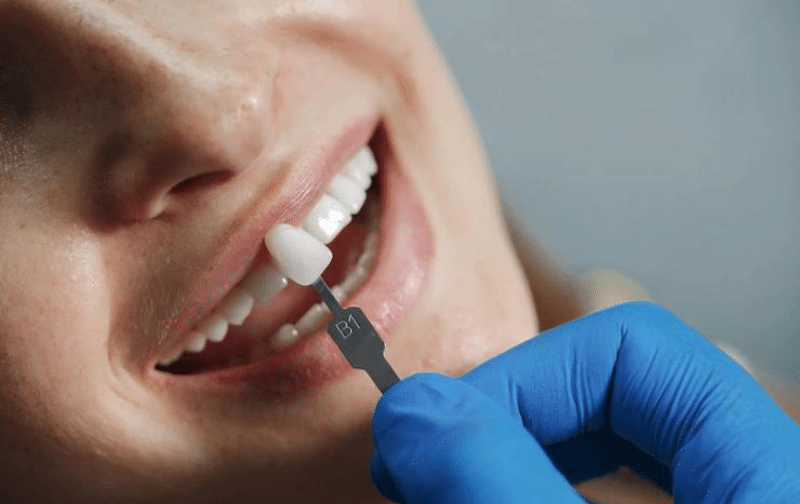If you are unhappy with your smile, you may be a good candidate for veneers. Veneers are thin pieces of porcelain that are bonded to the front surface of your teeth. They can improve the appearance of your teeth by changing their color, shape, and size.
What are Veneers?
If you are unhappy with your smile, you may be a candidate for veneers. Veneers are thin shells of porcelain that are bonded to the front of your teeth. This can help improve the appearance of your smile by hiding any flaws or imperfections.
Veneers can be used to correct a wide variety of cosmetic dental issues, such as:
- gaps between teeth
- misshapen or chipped teeth
- discoloration or staining
- permanently stained or yellowed teeth
Veneers are an ideal solution for people who want to improve the appearance of their smile without undergoing extensive dental work. The procedure is relatively simple and can be completed in just a few visits to the dentist.
If you are considering veneers in Woodland Hills, it is important to consult with a qualified cosmetic dentist to discuss if this treatment is right for you.
Benefits of Getting Veneers
There are many benefits that come along with getting veneers. For one, veneers can help restore your smile to perfection. If you have chipped, cracked, or stained teeth, veneers can cover up those imperfections and give you the perfect smile you’ve always wanted.
Another benefit of getting veneers is that they are a very durable option. They can last for many years with proper care and maintenance. Additionally, veneers are stain-resistant, so you won’t have to worry about your teeth yellowing over time.
If you’re looking for a way to boost your confidence and improve your smile, consider getting veneers. With their many benefits, they’re sure to give you the results you desire!
Types of Veneers
There are two types of veneers: direct and indirect.
- Direct veneers are made from a mold of your teeth and applied directly to your teeth.
- Indirect veneers are made from a mold of your teeth and then sent to a lab to be created. Once the veneers are ready, they will be applied to your teeth.
Both types of veneers are made from porcelain or ceramic.
- Porcelain is the more expensive option, but it is also more durable and looks more natural.
- Ceramic is less expensive but not as durable or natural looking.
The type of veneer you choose will depend on your budget and your needs. If you need a quick fix and don’t mind spending a little extra, direct veneers may be the best option for you. If you want something that looks more natural and will last longer, indirect veneers are the way to go.
How to Choose the Right Veneer for You?
When you are considering veneers, it is important to choose the right type for your needs. There are two main types of veneers: composite and porcelain.
- Composite Veneers: Composite veneers are made from a mixture of plastic and ceramic materials. They are less expensive than porcelain veneers and can be applied directly to the teeth. However, they are not as durable as porcelain veneers and may not last as long.
- Porcelain Veneers: Porcelain veneers are made from thin sheets of porcelain that are bonded to the front of the teeth. They are more expensive than composite veneers but they are also more durable and natural looking. Porcelain veneers can last for many years with proper care.
When choosing between composite and porcelain veneers, it is important to consider your budget as well as your aesthetic goals. If you want a more affordable option, composite veneers may be right for you. If you want a longer lasting solution with a more natural look, porcelain veneers may be a better choice.
Care and Maintenance of Your Dental Veneers
Assuming you have already had your veneers placed, congratulations! Veneers are a fantastic way to restore your smile to perfection. But like all dental work, they require proper care and maintenance to keep them looking their best. Here are a few tips on how to take care of your new veneers:
Brush and floss regularly
Just because you have veneers doesn’t mean you can neglect your oral hygiene! Be sure to brush at least twice a day and floss once a day to keep your teeth and gums healthy.
See your dentist regularly
It’s important to see your dentist for routine checkups and cleanings even if you have veneers. This will help ensure that your veneers stay in good shape and that your mouth stays healthy overall.
Avoid biting or chewing hard objects
Biting or chewing on hard objects (think: ice, hard candy, etc.) can damage or break your veneers. So be sure to avoid these things altogether.
Be careful with whitening products
If you want to whiten your teeth, talk to your dentist first. Some whitening products can damage or discolor veneers, so it’s best to get the okay from a professional before using any type of whitening product.
Conclusion
Veneers are a great way to instantly restore your smile and improve the look of your teeth. Veneers can help correct discoloration, chips, gaps and other imperfections in your smile quickly, easily and painlessly. With proper care, veneers can last for decades with little to no maintenance required. So if you’re looking for a quick fix that will dramatically improve the look of your smile, veneers may be the perfect solution!
FAQs
Q: What are dental veneers?
A: Veneers are wafer-thin, porcelain shells that are bonded to the front of your teeth. They are used to improve the appearance of your smile by changing the shape, size, and color of your teeth.
Q: How long do veneers last?
A: Veneers can last for many years with proper care. However, they may need to be replaced or repaired over time.
Q: How much do veneers cost?
A: The cost of veneers varies depending on the type of veneer, the number of teeth being treated, and the dentist performing the procedure.
Q: Are there any risks associated with veneers?
A: There are some risks associated with veneers, such as tooth sensitivity and damage to the underlying tooth structure. However, these risks are usually minor and can be avoided with proper care.

